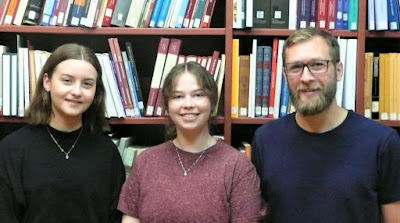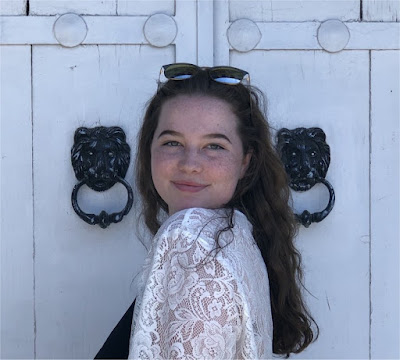Justin Dwyer is a PhD candidate in Classics at the University of British Columbia completing a dissertation titled “Apollodoros of Karystos and the Tradition of New Comedy.” Apollodoros, working in the first half of the third century BCE, was the most renowned comic poet to follow Menander, but he has been conspicuously overlooked in discussions on the fragmentary poets. Taking an integrative approach, Justin’s dissertation introduces Apollodoros’ fragments into these discussions, relying on formal, contextual, comparative, and historical analyses to better define his impact on the genre of New Comedy.
The dissertation argues that Apollodoros challenges many of the current assumptions about Athenian comedy in the Hellenistic period, but to properly contextualize Apollodoros and verify these claims, it is imperative to consider how the Euboean theatrical tradition might have shaped his dramatic works. No Euboean dramatic texts survive, but the epigraphic and coroplastic evidence attest to a distinct theatrical identity in Southern Euboea. This tradition represents an important alternative to Athenian drama, and its influence must be taken into account in any close study of Apollodoros’ work. A knowledge of the Euboean tradition would provide a useful new lens for interpreting individual fragments and also help identify any uniquely Euboean elements Apollodoros brought to the genre of Athenian comedy.
With the generous support of the Neda and Franz Leipen Fellowship and the Canadian Institute in Greece, Justin seeks to build a diachronic model of the Euboean dramatic tradition. An interdisciplinary on-location study of the rich material record for Hellenistic theatre in Euboea will provide much-needed support to the textual evidence already assembled. The analysis will focus on small-scale terracotta sculpture and consider both figurines and masks from collections in Karystos, Eretria, Chalkis, and Athens. Figurines capture an otherwise fleeting spectator experience and are particularly helpful in gauging the popularity of specific dramatic tropes, gestures, costuming, stock character types, and elements of stagecraft. The masks themselves suggest more nuanced details of characterization and human psychology. Analysis of the terracotta sculptures will be enhanced by consideration of the epigraphic record for local theatrical production and the early phases of the theatre at Eretria. With its deep roots in the archaeological study of southern Euboea, the Canadian Institute in Greece is an ideal support system in guiding and enriching the project.
Hilary Jay is a graduate of McGill University in Montreal where she majored in philosophy and art history. She is planning to study aesthetics at a graduate level in the future. Over the course of her undergraduate studies Hilary took interest in courses in the classics department and developed a sense of curiosity about the ancient world. Contemporary European philosophy is often engaged with ancient texts, and Hilary is particularly interested in phenomenological approaches to art and its history. She is interested in the changes in perception over time and the necessity of approaching artworks in an open and non-prescriptive way.
While in Greece, Hilary plans to visit artistic and archaeological sites to enrich her understanding of the significant role that historical works of art and philosophy play in the contemporary world. Working at the Canadian institute will be an excellent opportunity to gain experience in this field and will help to direct the course of further studies.
Emily Jackson is a third-year undergraduate student at Brock University, Ontario. She is majoring in Classics, specializing in the Art and Archaeology stream. Emily first discovered an interest in Greek mythology when reading a myth about Achilles in elementary school. Since then, she has found a greater interest in ancient Greek history, art and architecture, language, and philosophy at her university. In the future she hopes to further her education and learn more about other ancient civilizations as well.
While in Greece, Emily plans to obtain a greater understanding of Greek culture (both ancient and modern). She also plans to learn more about archaeological excavations, field studies and archaeology as a profession. Of course, she hopes traveling around Greece and interning at the institute will assist with both.
Jonathan Tomlinson
Assistant Director





No comments:
Post a Comment